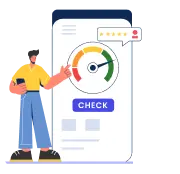Breaking the geographical barriers of money transfer, Western Union is actively engaged in transfer and receipt of money. Founded in 1851, Western Union was initially known for its telegraph services till 1871 when it introduced electronic money transferring services and gained prominence. Today, Western Union renders global payment services. It is present in more than 200 countries and deals in the payment and transfer of more than 130 currencies. More than 1 billion bank accounts have been transacted upon and the company is steadily gaining.
Who can Transact Business through Western Union
- Individuals – individuals and sole-proprietors in sending and receiving money through Western Union.
- Businesses – the company provides Western Union Business Solutions to help businesses transact their international business easily.
- Partnerships – cross-border partnerships can also benefit from using the payment solutions provided by Western Union.

Get Your Free Credit Report with Monthly Updates Check Now
Western Union in India
Western Union transacts business in India through a network of more than 50, 000 agents. There are certain limitations in using the Western Union service in India which are as follows:
- Firstly, individuals cannot send money from India to any individual in any other country. Money can only be received in India from any other country.
- Secondly, the Indian Government regulations prohibit businesses from utilizing the money transfer services provided by Western Union.
How does the Money Transfer Work?
Individuals in any country can remit money to an individual in India through the agent network of Western Union present globally. Here is how the process works:
- The individual based out of any foreign country is required to visit Western Union’s agent in his location.
- There the individual fills up a ‘To Send Money’ Form available at the agent’s office. The form contains three important details which are the name of the person to whom the money is being sent, the amount of money to be sent and the location where the money is being sent.
- The form is then deposited along with the amount of money to be remitted and the applicable fee. It is to be noted that the agent would accept money in the local currency only. For instance, if a person is remitting money from the United States of India, the payment to the agent in the USA would have to be in US Dollars. Moreover, the person remitting the money would also be asked to present his Government issued ID card if required.
- The agent then processes the form and issues a Money Transfer Control Number and the payment receipt to the remitter.
- The person to whom the money is remitted then visits the Western Union agent at his location.
- He is required to fill up a ‘Receive Money’ Form which contains the full name of the sender, the location from which money was sent, the amount of money sent and the Money Transfer Control Number.
- The form is then presented to the agent along with a valid identity proof.
- The agent then pays the money in Indian Rupees to the person receiving it.
The above method was the offline method which required a visit to the agent’s location. However, with the online and mobile platform gaining popularity, Western Union also allows individuals to send money to India both online and also via phone. Here is how the process works:
Sending money online
- The person sending the money registers on the website of Western Union, if he is a new customer, or simply signs in into his account if he is an existing one.
- Then he furnishes the receivers information online which includes the receiver’s full name, the location where the money would be collected and the intended amount of transfer.
- Additional services can be added to the money transfer service like a telephonic update to the receiver when the money is sent or a message included in the transfer.
- The sender then reviews his order which shows him the amount to be transferred and the required fees for such transfer.
- The order is then placed and payment can be made using the debit card or credit card of the sender.
- Upon successful payment, a Money Transfer Control Number is issued with the receipt of the transaction. The sender can then inform the receiver of the remittance.
- The sender is also required to call Western Union to confirm his transaction for security reasons.
Sending money over the phone
- The sender should call Western Union on the numbers provided.
- The operator would then have to be informed of the receiver’s information and the amount of money to be sent.
- The payment is to be made using the VISA, MasterCard or Discover credit or debit card.
Once payment is made, the Money Transfer Control Number is issued and provided to the sender.
Points to Note
Sending and receiving money through Western Union is a very simple affair. One has to though, remember some important points which are:
- A maximum of USD 2500 can be sent to India
- The service is available 24*7 while the online mode. Agents, however, might have fixed working hours.
- The receiver can avail a maximum cash payout of Rs.50, 000. Beyond this limit, crossed cheques would be issued.
Thus, Western Union facilitates money transfers which are not only secured, but also fast and convenient.

